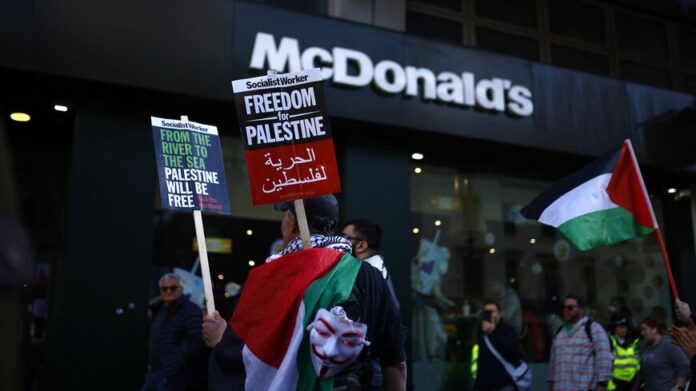The Impact of Global Boycotts on Western Corporations Supporting Israel
Critics argue that consumer boycotts do not yield significant results and only temporarily affect corporate behavior. However, after one year of consistent boycotts, the financial data tells a different story, revealing substantial declines in profits. These figures illustrate that organized and sustained efforts by consumers can inflict measurable damage. While the data is undeniable, major corporations have yet to fully divest from Israel, raising doubts about the long-term effectiveness of such boycotts.
Starbucks Faces Leadership Change Amid Boycott Pressure
The global boycott against Starbucks resulted in the unexpected ousting of CEO Laxman Narasimhan after significant financial losses. The company reported a 23% decline in international profits, which protestors linked to their perceived support of Israeli policies. Starbucks became a target for boycott movements, especially in regions showing strong solidarity with the Palestinian cause. The company’s financial losses, combined with the leadership change, reflect the tangible effects of this consumer movement. Nonetheless, Starbucks continues its operations in Israel, signaling that corporate withdrawal may be more complex than financial losses alone would suggest.
McDonald’s Revenue Declines Due to Consumer Boycotts
McDonald’s became a significant target of boycotts for its support of the Israeli military, and the company saw its revenue fall by 12%. Protesters pointed to the company’s financial damage as proof of consumer power in action. While McDonald’s remains a global player, its partial withdrawal from Israel highlights the potential economic impact of coordinated boycotts.
Fast-Food Chains Adapt Under Boycott Pressure
Other fast-food chains, such as Burger King and KFC, faced significant challenges due to their involvement in Israel. Burger King rebranded itself as “Börgır” in Turkey, aiming to distance the company from accusations of supporting Israeli actions. Meanwhile, KFC closed over 100 outlets in Malaysia after facing widespread protests. These strategic changes reveal how companies adapt to market pressures, demonstrating the power of boycotts in forcing corporate adjustments. Yet, despite these actions, both companies maintain their presence in Israel, which leaves the question of long-term effectiveness unresolved.
Coca-Cola and Pepsi Suffer Losses in International Markets
The beverage giants Coca-Cola and Pepsi experienced significant financial setbacks in Muslim-majority countries as a result of the boycott movement. Coca-Cola reported a 23% drop in sales in Bangladesh, while Pepsi saw substantial losses in the Middle East and Asia. These losses serve as clear examples of how consumer action can impact even the most established multinational corporations. Despite the losses, both companies continue their operations in Israel, illustrating the difficulty of sustaining a boycott’s influence beyond initial financial damage. The continued success of these companies suggests that boycotts may need broader support to achieve permanent corporate withdrawal.
Intel Halts Israeli Expansion Amid Boycott Campaigns
Intel, a major player in the tech industry, faced significant backlash from the boycott movement, leading to the suspension of its $25 billion chip factory project in Israel. The Boycott, Divestment, and Sanctions (BDS) movement strategically targeted Intel for its involvement in Israeli military technologies. Boycott supporters celebrated the suspension as a victory, viewing it as a blow to Israel’s tech industry. Despite this, Intel has not fully withdrawn from the Israeli market, and its presence in the country remains strong.
The Economic Consequences for Israel’s Economy
Since the war in Gaza Israel is facing significant economic disruptions, with over 45,000 companies reportedly closing. Israel’s tech sector and foreign investment have also suffered, with large corporations facing financial losses in international markets. Boycott supporters point to these figures as evidence of their movement’s success, believing that sustained consumer activism can weaken Israel’s economy. The long-term impact of the boycott movement on Israel’s economy remains uncertain, with both sides offering differing views.
Exposing the Limits of Boycotts on Western Corporations
Boycotts aimed at corporations supporting Israel’s war efforts have demonstrated financial impact but have yet to achieve long-term corporate divestment. While companies such as Starbucks, McDonald’s, and Intel have faced significant economic consequences, they continue their operations in Israel. These actions suggest that while boycotts can generate temporary financial losses, they may not be enough to force companies to change their political stances. As the movement continues, the challenge lies in converting financial damage into lasting corporate and political change.

